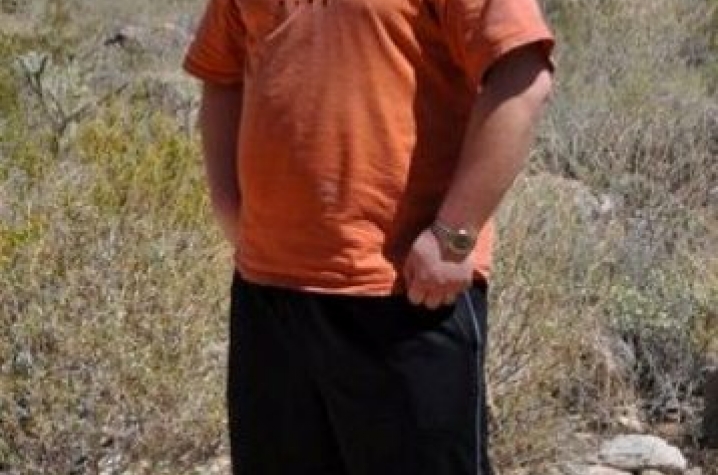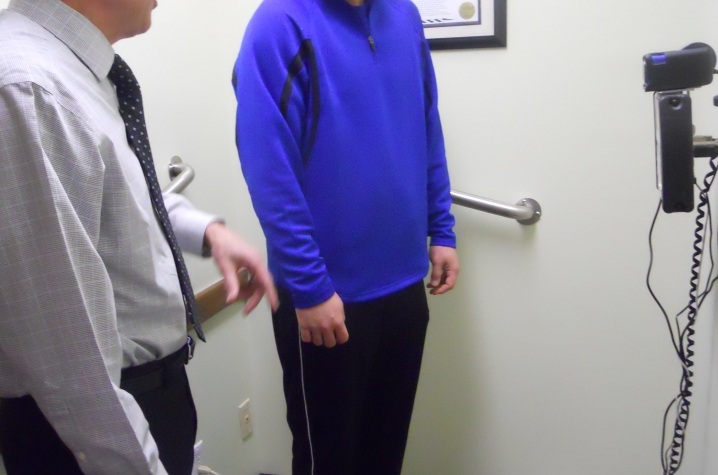Losing Made UK Diabetes Patient a Big Winner
LEXINGTON, Ky. (Feb. 24, 2012) − Eric Bowman struggled with weight his entire life. As a kid, he had plenty of access to food and as he grew into a teenager, the amount of food he ate increased as well. This became a bigger problem when at age 16 and weighing 300 pounds, he was diagnosed with type 1 or juvenile diabetes.
Managing the diabetes as a teenager was difficult for Bowman. By the time of his diagnosis, most of his eating habits had become ingrained and it was a major adjustment in how he lived his life on a daily basis. He started on one insulin injection a day that eventually increased to two a day, plus additional insulin before meals if his blood glucose levels were higher than normal.
"I felt isolated in a way because at the time, I didn't know any other diabetics and wasn't even aware that it was as widespread of an illness," Bowman said. "I think the main challenge was trying to fit in with everyone else while trying to eat the way I knew I was supposed to."
He also struggled with large fluctuations between high and low blood sugars due to the inconsistency of his eating and had to be hospitalized frequently to stabilize his glucose levels. It was in May 2000 when Bowman was 24 that he decided to switch from injections to an insulin pump in hopes that it would give him more flexibility with his eating and limit his big swings in glucose levels.
Bowman admits managing his diabetes became even more difficult as an adult because he lacked the discipline needed to manage the disease. He also had trouble trying to establish a regular routine of exercise to offset the amount of food he ate.
"I took the position that it didn't matter what I ate as long as I just took some more insulin," he said. "Problem was, I would forget to take the insulin sometimes and my blood sugar would skyrocket resulting in hemoglobin A1c values consistently above 9 percent, well above what is considered normal. "
The hemoglobin A1c test is an important blood test used to determine how well diabetes is being controlled by providing an average blood glucose level over an eight to 12 week period and is used in conjunction with home blood glucose monitoring to adjust medications.
A normal result is between 4 and 6 percent. Because studies have repeatedly shown that out-of-control diabetes results in complications from the disease, the goal for people with diabetes is a hemoglobin A1c of less than 7 percent. The higher the hemoglobin A1c, the higher the risks of developing complications related to diabetes, such as heart disease, blindness, amputation, kidney failure and stroke.
After years of struggle and topping out at 304 pounds on his 6'2" frame, the now 35-year-old Bowman knew he had to do something to bring his diabetes under control or face the inevitable consequences.
Following the advice and urging of Dr. Raymond Reynolds, professor in the Division of Endocrinology and Molecular Medicine at the University of Kentucky College of Medicine and clinical director of the Barnstable Brown Kentucky Diabetes and Obesity Center, Bowman decided to do something he'd never done before to lose weight and control his diabetes.
Bowman agreed to participate in a very structured program of behavioral change, goal setting, and accountability while being closely monitored medically by a team of health care professionals, including Reynolds, who has been with Bowman through the ups and downs for nearly 20 years. The decision to do this, rather than going it alone, would prove to be a life-changing experience for Bowman.
"Health Management Resources (HMR), a company based in Boston with a training center in Lexington, is a medically supervised weight loss program that is affiliated with UK," Reynolds said. "The UK endocrine division provides the medical supervision component of the program and HMR supplies the behavioral and health education component."
"HMR is a hidden gem," Reynolds said. "There is no other program like it in the country that manages people who are this medically complicated. We've seen the same dramatic weight loss results as bariatric surgery but without the risks of surgery." The key difference between surgery and HMR is the emphasis on long-term behavioral change. Changing the eating environment and controlling food portions with meal replacements such as low-calorie shakes and entrées are tools that are used to assist in altering eating behaviors.
Bowman began the program in July 2011 at 295 pounds. He dropped between 10 and 12 pounds the first week and tapered off to 5 to 7 pounds per week after that. Since starting, he's lost more than 80 pounds and now weighs 212. His insulin requirements dropped from 90 units a day to 30 units within the first five days of starting the program, he said.
He was able to completely stop his cholesterol lowering drug and went from several medications for high blood pressure to the very lowest possible dosage as a precautionary measure to protect his kidneys. Bowman says his diabetes is under control and his last HA1c was 6.9, well within the normal limits.
Reynolds also couldn't be happier about the changes he has seen in Bowman and says he would much rather take the lifestyle change approach to weight loss rather than the polypharmacy approach of continually upping his insulin and writing prescriptions for medications to treat the myriad of problems that accompany diabetes and obesity.
"Eric's level of activity is much greater as is his sense of well-being and interactions with his family," Reynolds said.
Bowman is now in phase II of the HMR program which is maintaining his current weight and regime. He continues with health education and group interaction although with his weight loss and tighter diabetes control, medical supervision is no longer necessary except for his regular appointments with Reynolds at the Kentucky Clinic.
"My eating was more a psychological desire than a physical desire," he said. "I've changed my thinking toward food and my outlook on life is different, I don't want to go back to where I was. I take it one day at a time."
Media Contact: Ann Blackford at (859) 323-6442 or ann.blackford@uky.edu









